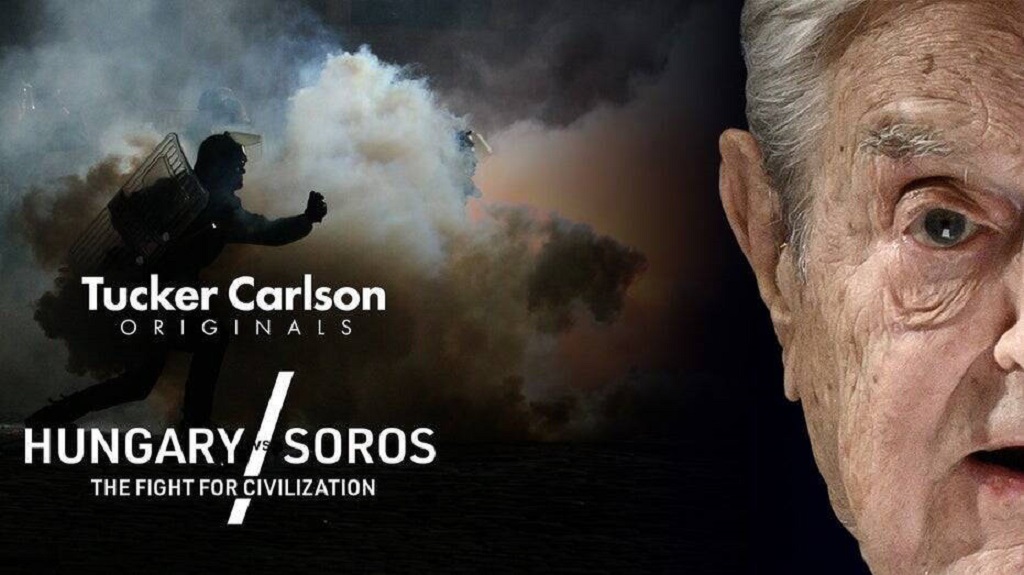By Álvaro Peñas
Viktor Orbán is once again the subject of a documentary. Almost a year ago, in February 2021, the Hungarian prime minister was vilified by his political enemies in a documentary on the Arte channel with the unmistakable title “Hello, dictator!” The new documentary has nothing to do with the previous anti-Orbán pamphlet and is a production by American journalist Tucker Carlson entitled “Hungary vs Soros. The fight for Civilization”.
The documentary reviews Hungary’s history and the many invasions it has suffered in the past, but stresses that the threats today are not foreign armies, but George Soros’ NGOs. American writer Rod Dreher argues that “Viktor Orbán and Fidesz have correctly identified the threat to Hungarian national sovereignty posed by Soros”. Carlson makes this point, noting that “unlike the threat posed by the Soviets or the Ottoman Empire, the threat posed by George Soros and his NGOs is much more subtle and harder to detect”.
“Soros opposes Viktor Orbán because he opposes nation states,” Carlson continues, “It is no coincidence that George Soros’ flagship NGO is called the Open Society Foundation. The best way to transform a country is to open it up to the world and in 2015, Soros had his chance to play a role in transforming the entire European continent […] by spending huge amounts of money on pro-refugee propaganda that then appeared in the global media. Soros also directly lobbied European governments to open their borders to impoverished people from all over the world. And they did. Only Hungary said No”. Hungary then erected a wall that succeeded in stemming the migration crisis, but for which it was punished by the EU. However, time has proven Viktor Orbán was right, and on 23 January the interior ministers of Austria, Bulgaria, Croatia, Cyprus, Denmark, Estonia, Greece, Hungary, Ireland, Latvia, Lithuania, Malta, Poland, Romania, Slovakia, Slovenia and Latvia demanded that the EU finance border wall projects to prevent the entry of illegal immigrants. The EU continues to refuse.
Returning to the documentary, Carlson uses parts of his interview with the Hungarian prime minister in August last year, as well as profiling Orbán and his relationship with Soros: “Orbán rose to world fame in the late 1980s as an anti-communist student leader. At that time, Orbán was a protégé of Soros. He attended Oxford University on a scholarship from the Soros Foundation, but as his political career progressed, so did his views. Orbán became a Hungarian nationalist. He and George Soros became bitter enemies”. For Orbán, Soros is “a very talented Hungarian, but we have talent not only for good things, but also for bad things. So he is that kind of man who does not respect the tradition of this country”.
But the fight against the open society is not only about border protection, but also about supporting the family and the birth rate to cope with the demographic problem. Hungary is taking this issue very seriously because, as Orbán points out, “we don’t want to leave this country to migrants, we want to leave it to our grandchildren”. Carlson mentions that the first thing he sees when he lands in Budapest are messages of support for the family and meets with Katalyn Novák, former family minister and now candidate for the Hungarian presidency: “We don’t think we have to import children to solve the demographic problem, we have to help young couples so that they can have as many children as they want”. The Hungarian family policy has managed to curb the demographic crisis and offers great financial incentives to couples who wish to have children and is one of the greatest successes of Viktor Orbán’s government.
The film also features a Spaniard, Rodrigo Ballester, from the Mathias Corvinus Collegium in Budapest, who denounces the EU’s obsession with Hungary. Ballester, who knows the inner workings of the EU well, points to the lack of political diversity among EU officials. “Hungary is portrayed as the black sheep of the EU. When I decided to move to Budapest, half of my colleagues thought I was going to North Korea or somewhere similar. One went so far as to tell me that in Hungary they put journalists in jail, which has never happened”. True, it has never happened, despite the continuous discrediting campaigns of Reporters Without Borders, a Soros network organisation. In Hungary, most of the press opposes Orbán.
For Carlson, “the battle between George Soros and Viktor Orbán is far from over”. The big problem for the liberals who oppose Orbán is that they cannot accept that within Western civilisation there is a national conservative alternative that is pursuing successful policies. The Hungarian elections have been called for 3 April 2022, the date of the next battle between George Soros and Viktor Orbán, between globalism and nationalism. Carlson ends his documentary by posing a simple question: “How can George Soros be defeated? The answer turns out to be simple, you need leaders who love their country and care about its future and the people who live in it, you need leaders who are willing to fight”.
Source: El Correo de España

